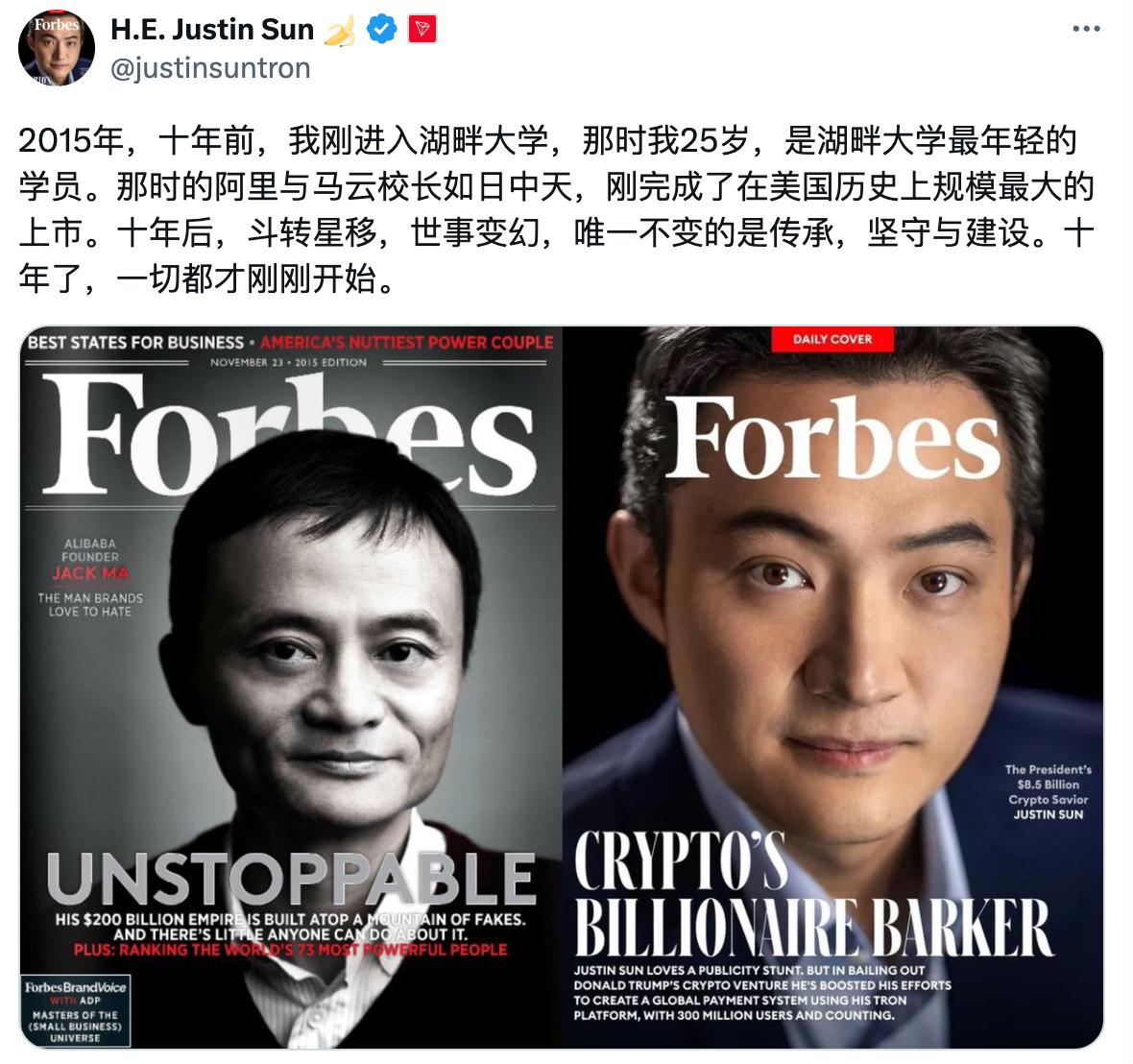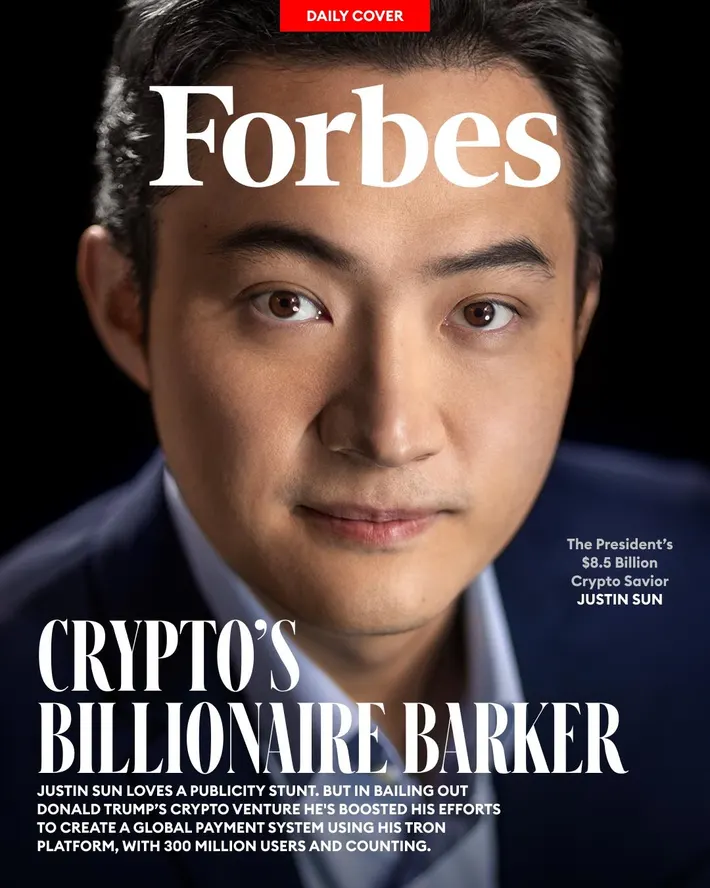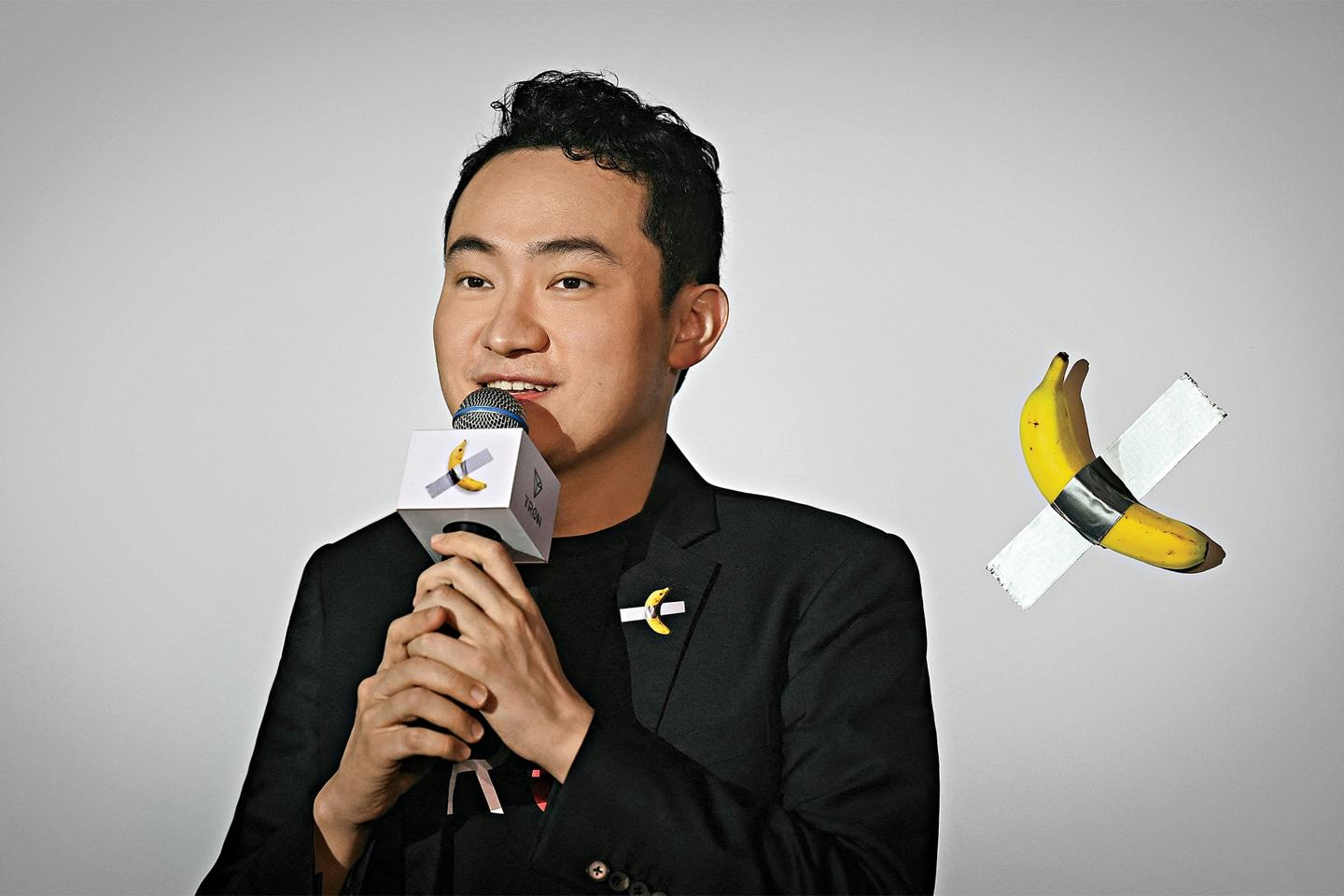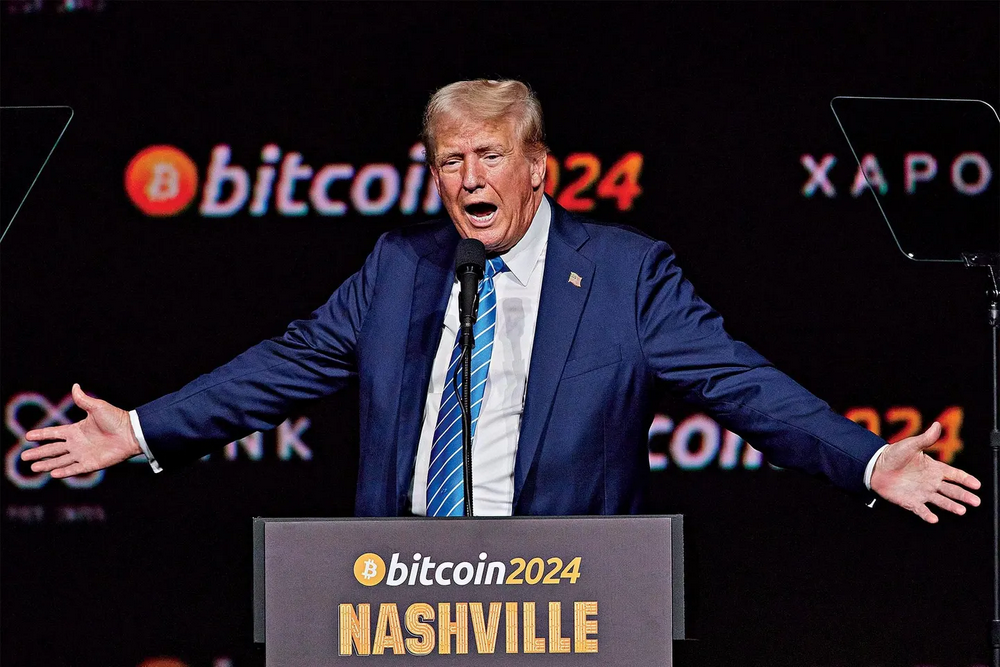Author: Techub Selected Compilation
Original title: "Meet The Crypto Billionaire Who Helped The Trumps Make $400 Million"
Written by: Forbes reporter Nina Bambysheva, Forbes reporter Steven Ehrlich
Compiled by: Tia, Techub News
Editor's note: On March 27, Justin Sun appeared on the cover of Forbes. Later, Justin Sun posted on X that he was honored to be on the cover of Forbes and to be called "the billionaire navigator in the crypto field." While appearing on the cover, Forbes also wrote an article for Justin Sun titled "Meet The Crypto Billionaire Who Helped The Trumps Make $400 Million." This article is a complete translation of the article.

The King of Cheat Codes | With his childish looks, uninhibited behavior and billions of dollars in wealth, Justin Sun is the OG of the crypto industry and the most hated person by industry ideologues. "In my 20s, I just wanted to try everything," he said. "Why not?"
Justin Sun loves to create hype. But while he saved Donald Trump’s cryptocurrency project and netted the president and his family $400 million, he was also pushing his own efforts to build a global payments system. His platform, Tron, now has 300 million users and growing.
The Chinese blockchain entrepreneur’s admiration for Donald Trump dates back to middle school. At the time, he was living in Huizhou, a city of 6 million people north of Hong Kong in China’s Guangdong province. His teacher encouraged students in his class to watch American TV shows to learn spoken English. So, using the peer-to-peer file-sharing service BitTorrent (which he would become the owner of a few years later), Sun started downloading reruns of The Apprentice.
The reality show did more than teach him how to pronounce Trump's "You're fired!" catchphrase correctly, however. The precocious teenager says he was drawn to the American tycoon's teachings on business competition, showmanship and, of course, self-awareness — concepts that were alien to China's Confucian and socialist society. But it was the early 2000s, and Deng Xiaoping's reform and opening-up policies were edging China toward capitalism, especially in Shenzhen, a city next door to Huizhou, which was experiencing rapid growth. "It was natural for The Apprentice to be popular in China," Sun says.
So it seemed like destiny (or, perhaps, opportunism these days) when he heard late last year that the Trump family’s cryptocurrency project, World Liberty Financial (WLF), was on the verge of collapse. WLF was in jeopardy, even though Trump himself was listed as the company’s “chief cryptocurrency advocate” and had just been elected president of the United States.
The reason is obvious. WLF’s so-called “white paper” (business plan in the cryptocurrency industry) is called the “Gold Paper” and features a portrait of Trump on the cover, looking like a superhero with golden glow. WLF plans to be another decentralized finance (DeFi) platform, but there are already hundreds of similar platforms, and it offers no equity, no reliable management team, and its tokens are completely illiquid. In addition, the fact that the Trump family could easily raise the $30 million needed to start up, but chose not to do so, further highlights WLF’s untrustworthiness. (In fact, Trump began to turn to using other people’s money rather than risking his own funds more than 30 years ago.)
But for Sun, 34, the potential payoff was clear. The Securities and Exchange Commission had been pursuing a lawsuit against him since March 2023, alleging market manipulation and selling unregistered securities. Now he had spotted a golden opportunity to make a killing directly for the man who would soon run the executive branch of the U.S. government, including the SEC itself.

Forbes Cover: Justin Sun’s Portrait Photographed by Gareth Brown for Forbes
At the end of November 2024, just three weeks after Trump won the election, Sun paid $30 million, ostensibly to cover WLF's operating expenses. "I think WLF is a strong player in the fintech space," Sun said, unconvincingly. However, when talking about the concept of Trump as the "CHEAT CODE" of the cryptocurrency industry, he expressed his views more fluently: "With him, our development will be much smoother than before."
The $30 million injection ignited a buying frenzy in the market, and its main beneficiaries were the Trump family. As if that wasn’t enough, a few weeks later, Sun invested another $45 million in WLF, 75% of which went directly into Trump’s pocket—according to the disclosed agreement, the Trump family can get 75% of the initial financing amount in excess of $30 million. Then, when Trump launched his own meme coin TRUMP in January 2025, Sun invested several million more. Taken together, these operations brought Sun only a small paper return, while his WLF holdings were locked indefinitely, and the Trump family made a huge profit of about $400 million. (In response, US Senator Chris Murphy commented in a Senate speech in early March: "This is essentially Trump launching his "Venmo" so that anyone can secretly transfer any amount to him."

Banana Republican | In the cryptocurrency industry, no one is better at monetizing sensational hype to amass a massive fan base and blockchain wealth than Justin Sun.
Peter Parks/AFP/Getty Images
Sun Yuchen's "donation" seemed to be rewarded. He was almost immediately appointed as an advisor to WLF. Then, in early 2025, after Trump officially took office, the U.S. Securities and Exchange Commission (SEC) withdrew almost all lawsuits and investigations against the cryptocurrency industry, including cases against exchanges such as Coinbase, Kraken, and Robinhood. The SEC even "suspended" the lawsuit against Sun Yuchen and his company.
For the most transactional billionaire in the cryptocurrency industry, this is just daily business. If you want to hear an idealistic account of Satoshi Vision, a new financial system governed by its users and free from the control of central banks and tech giants, you won’t hear it from Justin Sun. He is a pure opportunist. He has little computer programming ability, and nearly every company he has founded or controlled has been accused of copying the business models of industry pioneers.
But for now, at least, it’s working. Ethereum was once the darling of the crypto industry, a blockchain with smart contract capabilities—so Sun built a faster, cheaper version: Tron, which is now worth $22 billion. He watched the success (and failure) of Binance and FTX, so he acquired Panama-based cryptocurrency exchange Poloniex and Asia-focused HTX (formerly Huobi). He launched SunSwap after seeing the rise of Uniswap as a decentralized finance (DeFi) protocol.
Acting fast and replicating patterns has enabled Sun to amass a vast fortune at an astonishing rate. Like his childhood idol, Trump, he apparently cares deeply about Forbes’s assessment of his wealth and claims a net worth of more than $40 billion, including large amounts of Bitcoin and Ethereum, as well as artworks by Picasso and Warhol, and an Airbus A330.
As with Trump, it’s hard to take literally anything Justin Sun tells you as the truth, at least when it comes to his assets. He owns a dizzying network of wallets, and has some of his assets registered to other people. We’ve heavily discounted several assets he claims to own (such as HTX, the exchange where he claims to have stored a large amount of his personal crypto), and ignored many smaller, unverified assets.
But even with all that skepticism, Forbes still estimates Sun’s net worth at $8.5 billion, acknowledging that it could be far more than that, and that it’s likely to soar now that the SEC has given him a way out.
Sun was born in 1990 in Qinghai, a remote province bordering Tibet. When he was 4, his family moved to bustling Guangdong. He grew up immersed in the world of words—his mother was a sports reporter for a daily newspaper in Huizhou, and his father covered political news in Qinghai. Literature was his first love, inspired by Mo Yan, the Chinese novelist and Nobel Prize winner, and Michel Foucault, the French philosopher, whose work explores how power defines and controls knowledge. In 2007, Sun won a national writing competition and qualified for Peking University. Initially, he wanted to study literature and aspire to become a major writer, but once he entered Peking University, he switched to specializing in global history. "That's why I see the world as a unified whole," he said.
Like many aspiring Chinese students, he set his sights on the United States. In 2011, he enrolled at the University of Pennsylvania, Trump’s alma mater, to pursue a master’s degree in political economy. Then, in 2012, a New York Times article about Bitcoin changed everything. “People told me that this would be the currency of the future, the currency of the Internet,” Sun recalled. He downloaded a Bitcoin wallet, and a friend transferred some Bitcoin to him, and he was immediately attracted. After that, he spent day and night in Bitcoin forums, madly absorbing all the new technology information he could find.
One of the forums brought him into contact with Stefan Thomas, then the chief technology officer of Ripple Labs, which was trying to build a decentralized alternative to SWIFT, the global interbank payment network. Ripple's XRP token was designed to serve as a bridge between global fiat currencies, requiring gateways in different countries. In 2013, Thomas invited Justin Sun to become Ripple's chief representative in China.
Not bad for a twentysomething, but Sun irked some people from the start. “He always talked about his connections to the Chinese Communist Party and the government, but to be honest, I don’t think those connections helped in any substantive way,” recalls a former Ripple colleague who requested anonymity. “Imagine there’s a startup and Justin walks in wearing Prada shoes and a Gucci shirt. He’s extremely hungry for money. You can tell he’s going to do whatever it takes to make himself rich.”

Profit-seeking president | Despite his disdain for Bitcoin during his first term, Trump 2.0 now wants to make the United States "the undisputed Bitcoin superpower and global cryptocurrency center." With his Meme coin and a DeFi platform that allows anyone or entity to invest without disclosure, Forbes estimates that Trump and his family may have made $575 million in profits from cryptocurrencies.
Image credit: Ohnnie Izquierdo/The Washington Post/Getty Images
Soon after, Sun joined Ripple, and Ethereum quickly rose to prominence. Compared to Bitcoin, Ethereum's smart contracts offer more powerful features and have become a new market hotspot. Sun invested in Ethereum's ICO in 2014, but ultimately decided that while Ethereum's transactions were faster than Bitcoin's, they were still too slow. And Ripple also failed to successfully integrate smart contracts. At this point, a flash of inspiration came: a new blockchain that combined the speed of XRP with Ethereum's smart contracts. "We need something cheaper, faster, but compatible with Ethereum," Sun said. In 2015, he left Ripple and launched Tron in 2017.
From the beginning, Tron has been accused of plagiarizing technical documents from Ethereum and other blockchains. For example, Juan Benet, founder of Protocol Labs (the team behind Filecoin), tweeted in 2018 that Tron's white paper directly copied nine pages of his paper. Ethereum co-founder Vitalik Buterin also ridiculed Sun Yuchen in 2018, replying to a tweet listing the differences between Ethereum and Tron: "Better white paper writing ability: (Ctrl+C + Ctrl+V is much more efficient than typing on a keyboard to create new content)."
But Sun was unwavering, insisting that Tron’s similarities to Ethereum were intentional. “At that time, it was very important to be compatible with Ethereum,” he said.
No one has contributed more to Sun’s early success than Binance founder Changpeng Zhao (CZ). Sun said he first met CZ in 2015, when CZ was still working at the predecessor company of Blockchain.com. In August 2017, Binance helped Tron complete a $70 million ICO, just days before the Chinese government banned ICOs altogether.
In November 2018, after the ICO bubble burst, CZ launched Binance’s Gold Label Project, which aims to help troubled crypto projects and improve industry information transparency. Tron was one of the first projects to receive support. As Tron became the default option for Binance’s 10 million users to pay with USDT (Tether), its business grew rapidly.
At the end of 2019, Binance once again helped Sun Yuchen by offering an annualized rate of return of 16% for USDT on Tron, and quietly providing free withdrawals and internal transfers, which gave Tron a huge advantage in its competition with Ethereum. According to Messari research data, from October to December 2019, the supply of USDT on Tron surged from about US$100 million to nearly US$1 billion, accounting for about 30% of the stablecoin market at the time.
Today, Tron has become the main blockchain for USDT transactions. In 2024, the revenue of the Tron blockchain reached $2.2 billion, second only to Ethereum's $2.5 billion.
But how long can the fast-growing "Crypto Wild West" last?
Tron, which also attracts ordinary users, has also become a hotbed for terrorists, drug dealers, money launderers and scammers. According to a report by blockchain intelligence company Inca Digital, terrorist organizations such as Hamas and Hezbollah have transferred more than $2 billion in funds through Tron. TRM Labs' "Crypto Crime Report" pointed out that 58% of all illegal crypto transactions last year (nearly $10 billion) occurred on Tron, exceeding the total of Ethereum and Bitcoin.
Justin Sun claims that he is working to make Tron more secure. Last September, Tron, Tether, and TRM Labs announced a partnership to form the T3 Financial Crimes Unit to combat illegal activities within the Tron ecosystem. Since its inception, T3 claims to have frozen $130 million in funds.
However, the U.S. side is mostly skeptical. Stablecoin issuer Circle has completely stopped doing business with Sun's blockchain. In addition, in December 2024, top crypto exchange Coinbase delisted "wrapped Bitcoin (wBTC)" on the Ethereum blockchain, an asset widely rumored to be controlled by Sun. "Sun's association with wBTC and his possible control pose an unacceptable risk to Coinbase's customers and the integrity of the exchange," Coinbase said in court documents. Sun declined to comment on the matter.
The Securities and Exchange Commission’s (SEC) charges against Justin Sun have been suspended, but they are still serious. Sun and the Tron and BitTorrent Foundations, which he allegedly controls, are accused not only of selling unregistered securities but also of artificially inflating the price of its blockchain token, TRX, through fake “wash trading” in 2018 and 2019. Sun allegedly instructed employees to open multiple accounts and conduct hundreds of thousands of trades to create the illusion of strong market demand. The SEC also accused him of paying celebrities such as Lindsay Lohan and Jake Paul to endorse TRX without disclosing the compensation. (Sun declined to comment on the SEC’s lawsuit.)
All of this makes his collaboration with Trump particularly “ingenious.” Sun Yuchen said he has never met President Trump, but has recently been in contact with his sons Eric and Donald Trump Jr., who are partners in the WLF (World Liberty Foundation) along with the son of Trump’s friend and former Middle East envoy Steve Witkoff.
Justin Sun knows that cryptocurrencies require public trust, so he hopes to use the influence of the US president to enhance the credibility of the market among retail investors. He said: "TRUMP really breaks the boundary between Web3 and the traditional world. Even my mother asked me about this token."
He added: “I think Trump’s election started to drive a lot of crypto business, and in this super cycle, it’s actually a big benefit to the entire industry.”
In fact, this Tuesday, World Liberty announced the launch of its own stablecoin, USD1, a digital dollar backed by short-term U.S. Treasuries, cash reserves, and other cash equivalents. Given that Congress is about to submit a bill on stablecoins, and Trump may ultimately decide its fate, this conflict of interest is obvious.
Sun also mentioned that the launch of the TRUMP token sparked a global backlash, with his exchange HTX adding 1 million new users in a week, many of whom were from China, where cryptocurrency trading has been effectively banned. Even more intriguing is that, according to Sun, Chinese authorities allowed the meme coin to be discussed on social media for days.
“The Chinese government doesn’t want to be seen as suppressing Trump,” he said. “I think they’re afraid that someone will tell Trump that the Chinese government is blocking your token.”
“I’m thinking about AI agents. They won’t work for free, they’ll need a strong payment system. Imagine a global AI job market and a reliable payment network running 24/7.”
Although Sun has never met Trump, he clearly understands the tactics of America’s greatest marketer. Unlike many crypto industry leaders who crave anonymity, Sun is happy to spend big and create publicity-grabbing stunts.
In 2019, he attracted attention when he paid $4.6 million to win a lunch with the investment tycoon at Buffett’s annual charity auction. Even more notable was his abrupt cancellation three days before the planned meeting. (He eventually dined with Buffett in Omaha, Nebraska, a year later.)
In 2021, he repeated the same trick and won the qualification to become the first manned paying passenger of Blue Origin, owned by Jeff Bezos, with a bid of US$28 million. He then missed the launch due to "schedule conflicts", which attracted more attention.
Last November, as he finalized his investment in Trump, he paid $6.2 million for a piece of conceptual art at Sotheby’s: “The Comedian,” a banana taped to a wall by the Italian artist Maurizio Cattelan, which he ate 10 days later at a press conference in Hong Kong.
He also calls himself “His Excellency,” a title that comes from his time as an ambassador to the World Trade Organization in the tiny Caribbean nation of Grenada. He is also the “prime minister” of the “Free Republic of Liberland,” a “microstate” that claims sovereignty over a stretch of territory along the Danube River in Croatia. So what nationality does this Chinese-born “Excellency”—who, in addition to these questionable titles, seems to spend most of his time in Hong Kong and has labeled his location as Switzerland on X (formerly Twitter)—actually hold? “I think I could say St. Kitts, maybe,” he says.
“A lot of people probably think I do these things to get attention,” he said, “but actually, when I actually achieve something in the crypto industry, that’s when I gain the most.”
Indeed, the drama has diverted attention from his savvy growth strategy. His “copycat” DeFi exchange SunSwap, built on the Tron blockchain, has exploded in volume in 2024, employing the same low-initial-fee strategy he used to popularize USDT. In December 2024 alone, SunSwap processed more than $4 billion in “wrapped” token volume. Similarly, SunPump (Sun’s clone of the Meme Coin Factory on Solana) is churning out a variety of hot, exotic tokens at a rapid clip. Since its inception in August, it has minted 97,000 tokens with a total market cap of just $37 million (by comparison, Solana’s total meme coin market in 2024 reached $600 million). But Sun believes Asia will be the next big market for meme coins, and he’s building SunPump into a leader in the space. “I think meme coins are empowering the entire internet,” he says.
So what’s next? “These days, I’m thinking about AI agents,” Sun said. As someone who always chases trends, he now considers Elon Musk as his main idol. He hopes Tron can become a world-class payment infrastructure to support a future society driven by intelligent machines.
“For example, if you need to complete a task, one AI agent hires another AI agent, and then hires ten more within a minute, this is simply impossible in the traditional system. You need payroll, bank accounts - it may take six months to complete the initial process.” Sun Yuchen said. “But on a highly scalable network, everything can be done in five minutes, or even five seconds, which will make many things possible. Imagine a global AI job market - of course, a global reliable payment network that runs 24/7 will be the foundation of all this.”
Sound crazy? For Sun, that’s no problem at all. He loves the attention, is used to being underestimated, and doesn’t seem to care whether his partnership with the Trump family actually buys him some kind of immunity.
"The way regulators think is that everyone must follow the rules. But most regulations are made for the past, but are used to regulate future activities," Sun said. "I want to be a builder of the future world. But first, we need to imagine what the future world will look like."












